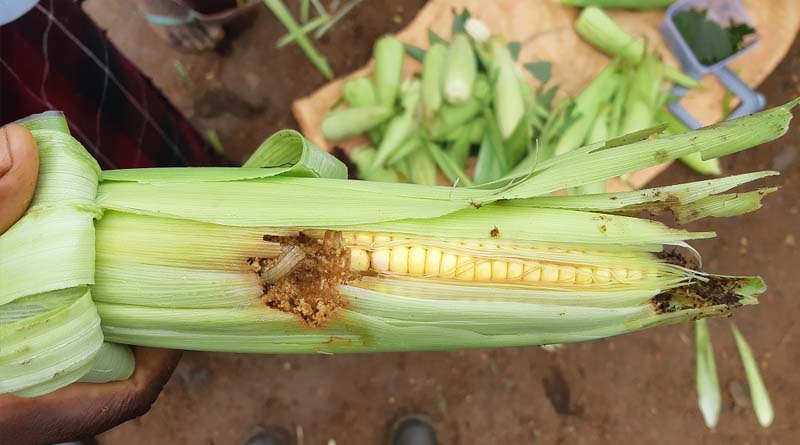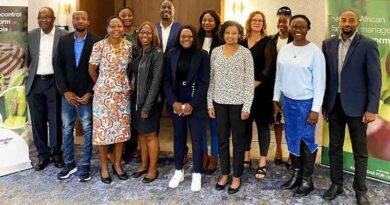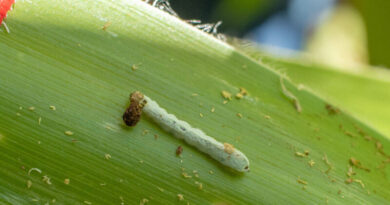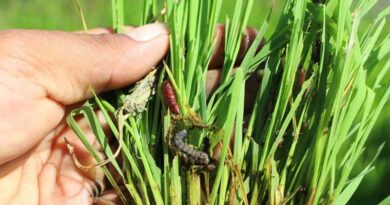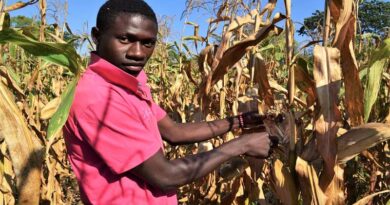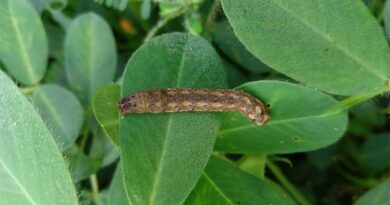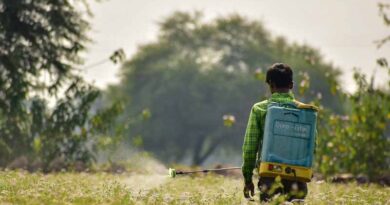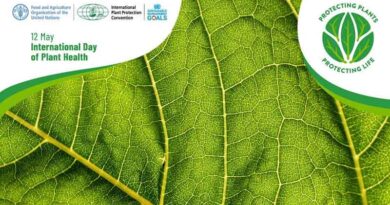Study examines potential for collective action to fight fall armyworm with biological controls in rural Zambia
30 May 2023, Zambia: A new study led CABI scientists has examined the potential for collective action to fight the fall armyworm (FAW) pest with biological controls in rural Zambia.
The research, which was conducted in partnership with colleagues from the Zambia Agricultural Research Institute (ZARI) and Wageningen University and Research, found that some conditions are already in place but others need to be strengthened to collective pest management of the FAW to be sustainable.
Fall armyworm (Spodoptera fruigiperda) is an alien invasive pest from the Americas which was detected in Zambia in late 2016 and has since caused significant losses on maize – threatening livelihoods and food security.
Reliance on synthetic pesticides
Farmers rely upon synthetic pesticides to fight the pest but this approach poses risks to human health, the environment and biodiversity.
Biological control options, on the other hand, have been proven to be an efficient, cost effective and safer method for pest and disease management. When adopted collectively, its effectiveness can increase.
The scientists, whose work is published in the CABI Agriculture and Bioscience journal, sought to fill a gap in understanding social and institutional conditions in low-and middle-income countries (LMIC) where the national plant health system, in-place to prevent and manage biological invasions, is limited.
Some conditions for collective action in place
They found that some conditions are already in place to support a collective action to manage fall armyworm. These include matching rules to local conditions, collective-choice arrangement, a conflict-resolution mechanism and minimal recognition of rights to organize which are supported by traditional leadership of the communities.
However, other conditions would need to be strengthened for the collective pest management to be sustainable. The most important criteria for a pest management innovation selected by participants from both districts, in no specific order, were price, efficacy, recommended by agrodealer/extension officer and immediate action.
Léna Durocher-Granger, lead author of the research, said, “Our study emphasizes the need to redefine technologies and dissemination in terms of supporting the processes of co-designing innovation based on social and ecological conditions.”
The research looked at the feasibility of creating a collective action to promote biological control for fall armyworm among smallholder farmers in rural Zambia and the social and institutional conditions needed for it to be successful and sustainable.
The scientists conducted focus group discussions and in-depth interviews in two provinces – Central and Southern – with maize smallholder farmers.
Very few farmers identified correctly, for instance, the FAW lifecycle stages when asked compared to other common pests affecting maize in Zambia. When asked to organize the FAW lifecycle, in general, the pupa stage was not recognized or was misplaced in the cycle compared to the correct order (moth-egg-caterpillar-pupa).
Focus on biocontrol
When asked if they had heard of biocontrol, all 12 farmers in Mumbwa said they had never heard of it while only two in Siavonga recalled an introductory meeting at the beginning of the project where biocontrol was mentioned as an option to control FAW.
The two farmers described biocontrol as a practice that targets the pest without harming other beneficial insects and is friendly to human health and the environment. All 24 farmers were aware that once one of them see FAW in his/her field, everyone else has it, demonstrating knowledge on interdependency amongst farmers.
Ms Durocher-Granger added, “If properly coordinated, biocontrol schemes implemented at the landscape level have the potential to significantly reduce the need for applying pesticides, and in this case, increase food safety and security and the livelihoods of vulnerable marginalized farmers. However, further empirical research and implementation trials on biocontrol options are needed.”
“To successfully achieve collective management of highly mobile and invasive pests, we therefore recommend developing a long-term plan with farmers to progressively transition towards natural pest regulation provided by ecosystem services where chemicals are the last resort.”
Also Read: FMC launches new soybean herbicide for Madhya Pradesh farmers
(For Latest Agriculture News & Updates, follow Krishak Jagat on Google News)

